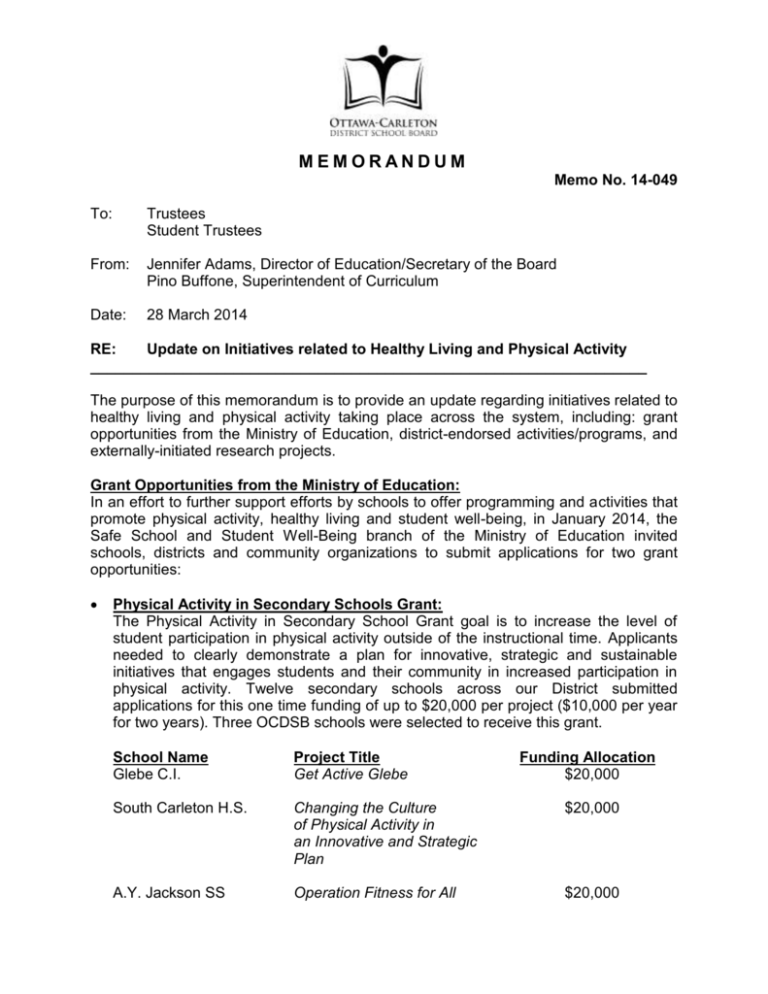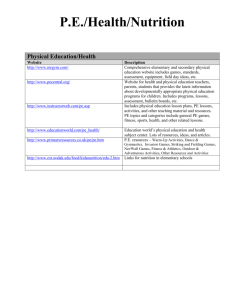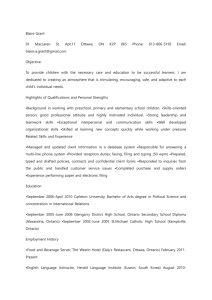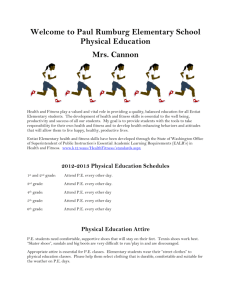memorandum - Ottawa-Carleton District School Board
advertisement

MEMORANDUM Memo No. 14-049 To: Trustees Student Trustees From: Jennifer Adams, Director of Education/Secretary of the Board Pino Buffone, Superintendent of Curriculum Date: 28 March 2014 RE: Update on Initiatives related to Healthy Living and Physical Activity __________________________________________________________________ The purpose of this memorandum is to provide an update regarding initiatives related to healthy living and physical activity taking place across the system, including: grant opportunities from the Ministry of Education, district-endorsed activities/programs, and externally-initiated research projects. Grant Opportunities from the Ministry of Education: In an effort to further support efforts by schools to offer programming and activities that promote physical activity, healthy living and student well-being, in January 2014, the Safe School and Student Well-Being branch of the Ministry of Education invited schools, districts and community organizations to submit applications for two grant opportunities: Physical Activity in Secondary Schools Grant: The Physical Activity in Secondary School Grant goal is to increase the level of student participation in physical activity outside of the instructional time. Applicants needed to clearly demonstrate a plan for innovative, strategic and sustainable initiatives that engages students and their community in increased participation in physical activity. Twelve secondary schools across our District submitted applications for this one time funding of up to $20,000 per project ($10,000 per year for two years). Three OCDSB schools were selected to receive this grant. School Name Glebe C.I. Project Title Get Active Glebe Funding Allocation $20,000 South Carleton H.S. Changing the Culture of Physical Activity in an Innovative and Strategic Plan $20,000 A.Y. Jackson SS Operation Fitness for All $20,000 Get Active Glebe According to a school-wide survey conducted in February of 2014, only 40% of Glebe students considered themselves very active. Time was listed as the biggest barrier to being active on a consistent basis. The team at Glebe wishes to capitalize on under-utilized school facilities and willing community agencies keen to build sustainable partnerships to increase the level of participation in physical activity. This funding will allow the school to enhance its facilities and to purchase new equipment so that, along with community partners, they can offer a high quality, fully sustainable activities program. Changing the Culture of Physical Activity in an Innovative and Strategic Plan A major challenge identified with the decrease in physical activity at South Carleton HS is the reduction of students electing to take a Health and Physical Activity course beyond the compulsory grade 9 course. Existing intramural-led activities tend to attract those already physically active. By establishing a student-lead Athletic and Wellness Council, the school hopes to increase the participation rate of students in a refurbished Fitness and Wellness Centre. Operation Fitness for All Trying to engage the non-athletic students in physical activities at A.Y. Jackson SS has been identified as a major hurdle. It is a reality that many students do not engage with physical activity beyond the compulsory grade 9 Health and Physical Activity course. By inviting students into a fitness room with updated cardio and resistance equipment that is safe and fully functional, the school is convinced that it will improve the overall health and well-being of its student body. The opportunities to engage all students and be non-competitive in nature (no try-outs or skills required). Senior students from the Exercise Science class will be closely involved with the planning and delivery of activities. Opportunities for students to receive fitness instructor certifications will be available at no cost in exchange for participation in physical activity. Healthy Eating in Secondary Schools Grant: The Healthy Eating in Secondary School Grant goal is to help transform the food culture in secondary schools and to develop sustainable partnerships. Applicants needed to clearly demonstrate a plan for innovative, strategic and sustainable initiatives that engages students and their community in changing the food culture in their school. Four secondary schools across our District submitted applications for this one-time funding of up to $50,000 per project. One OCDSB site was selected to receive this grant. School Name Norman Johnston Alternate Program Project Title Norman Johnston is Nuts for Nutrition Funding Awarded $50,000 Norman Johnston is Nuts for Nutrition In a recent student survey, only 33% of students reported having eaten breakfast and 22% reported having brought something to eat at lunch. Students are complaining of hunger and often do not readily have access to nutritious food, which leads them to make unhealthy eating choices. This funding will be used for many different projects, all working together to make Norman Johnston a hub of healthy eating in the community and the school district. Student ambassadors will be trained in leadership, nutrition, and cooking so that they have the confidence to engage others. Woodworking students will plan and build an accessible garden to be planted and tended by seniors from Blackburn Lodge alongside students. Students will use the produce grown to make and serve affordable meals in a new foods room. All food prepared will be healthy, as a partner dietitian will provide education and guidance to the students establishing the menus. District-endorsed Activities/Programs: The following activities/programs have been endorsed by the district, at the elementary and secondary levels. School Travel Planning Project – Elementary A joint initiative between the Ottawa Student Transportation Authority (OSTA) and Green Communities Canada, the School Travel Planning Project aims to gain a better understanding of the barriers that impede active travel to schools, as well as the creation and implementation of a comprehensive travel plan for each school that addresses the identified barriers. This initiative was initially implemented in the 20092010 school year in the district and has involved 13 elementary schools since that time. Due to the nature of the work involved (i.e., collection of baseline and follow-up surveys with parents/guardians and children), details of this project are vetted through the Ottawa-Carleton Research Advisory Committee (OCRAC) to ensure that processes in place for the conduct of research by external parties are followed. The travel plan is to be developed by a team of relevant stakeholders from within the school and the community. This project intends to build the capacity for a safer physical environment both on the school site and in the immediate vicinity of the school. Longest Day of Play - Elementary In partnership with the Ottawa Senators Foundation and the Education Foundation of Ottawa, a fundraising initiative that promotes physical activity among elementary students has been established for the spring of 2014. For 24 consecutive days, beginning on 28 May 2014 and ending on the “Longest Day of Play” on 20 June 2014, students will be encouraged and supported by their teachers, administrators and families to track 60 minutes of Daily Physical Activity (DPA) each day. At the end of the 24 days, the students will have completed a cumulative 24 hours of exercise – an achievement to be collectively celebrated on the symbolic “Longest Day of Play” on 20 June 2014. For the duration of the campaign, students will collect pledges from families, friends and neighbours to support their commitment to achieve their 24 hours total of exercise. The funds raised by the students will be shared between the Ottawa Senators Foundation and the Education Foundation of Ottawa, and will be used in part to support the Sens@School! Program, as well as athletic, arts and extra-curricular activities for students across the District who would not otherwise be able to afford these activities. Igniting the Spark - Secondary Igniting the Spark is a program that pairs physical activity with learning in all subjects. The initiative provides opportunities for students to engage in fitness activities that help them to achieve optimum heart rates to support and maximize their learning. After a fitness class, students transition to an academic class. Over the last four years, a total of eight schools in the District have participated in Igniting the Spark. In addition, approximately seven other secondary schools in the District have expressed interest in learning more about the program, as have a number of schools in other districts. The program has been implemented using several models. Some secondary schools have de-semestered one instructional period where the first half of the period (35 minutes), the students engaged in fitness initiatives and, in the second half of the period, the students attended an academic class. The immediate transition from a fitness class to an academic class helped place the students into their optimal learning zone. The benefit of team-teaching also helps to address both positive accomplishments and issues if they arose. Other secondary schools ran the program in one semester with a fitness class preceding an academic class. Some other schools have incorporated fitness 'bursts' into classroom activities. Pairing fitness with academics helped to improve learning readiness in the students and increased their confidence in their learning and in themselves. The schools that participated in the program commented that it was a huge success in regard to the following: increased student achievement, student engagement, learning readiness, fitness and wellness, confidence and self-esteem and positive behaviour in classes. The program greatly helped to support desired learning outcomes and establish clear goals for students to work towards overall curriculum and wellness expectations. In addition to the improvement of student academic achievement, the initiative also helped to: establish a healthy connection for students to the school, improve attendance and student engagement, and establish a partnership among subject teachers, special education teachers, guidance and the administration in schools. The program supports students to take positive steps towards their overall physical and mental wellness and health. An OCDSB network is planned in mid-April for interested schools to learn more about the initiative. Externally Initiated Research Projects: At present, there are 20 externally initiated research projects that have been approved by the Ottawa-Carleton Research Advisory Committee for implementation in OCDSB schools during the 2013-2014 school year, including the following projects that have a physical activity and/or healthy living focus: Project Title & Institution Project Description Health Behaviour in School-aged Children (HBSC) Study: 2013-2014 Queen’s University/World Health Organization/Public Health Agency of Canada School Travel Planning (STP) Project Green Communities Canada Update to the 2009-2010 study that aims to gain insight into attitudes, behaviours, and lifestyles of youth; and, to examine relationships between contextual factors and health behaviours. Implemented in 2009-2010 in OCDSB schools, this project aims to gain a better understanding of the barriers that impede active travel to school; and, the creation and implementation of a comprehensive travel plan for each school that addresses the identified barriers. # OCDSB Schools Targeted 23 elementary 2 new elementary (11 others since 2009-2010) Project Title & Institution continued Project Description Status of Daily Physical Activity (DPA) The third of a series of studies that in Ontario Elementary Schools seeks to assess implementation of DPA Public Health Ontario at the provincial level (i.e., the first two focused on initial policy development and implementation, and role and experiences of public health units, respectively. Vanity: Novel Digital Media Tools to Examines the efficacy of online games in Promote Tanning Bed Avoidance and teaching youth about the risks of indoor Prevent Melanoma tanning. University of Ottawa # OCDSB Schools Targeted 3 elementary, 2 secondary secondary The remaining 16 projects can be categorized into the following areas of study: curriculum implementation/teaching and learning (8); mental health/social development (7); and school climate (1). During the 2012-2013 school year, the Ottawa-Carleton Research Advisory Committee approved 24 of 55 research projects for implementation in elementary and/or secondary schools within the Ottawa-Carleton District School Board and the Ottawa Catholic School Board. The following table provides an overview of the projects that had a focus on physical activity and healthy living: Project Title & Institution Project Description Canadian Assessment of Physical Literacy CHEO Teachers Perception of the School Nutrition Environment in Ottawa: A Social Ecological Approach University of Ottawa Development of an assessment tool to measure physical literacy amongst students. To gain insight into teachers perceptions of current practices in the school environment that could have an influence on a child’s eating behavior in response to the obesity epidemic. To examine appropriateness and effectiveness of current SHAPES feedback report that is used to share information back to schools with respect to the SHAPES survey conducted biannually in Ontario schools. Conducted every two years in Ontario schools, this survey monitors substance use, mental health indicators, physical health indicators, and risk behaviours among students in grades 7-12 over time. Findings from Ottawa students are used by Ottawa Public Health to inform public health programs and services for Ottawa schools. Developing a more effective schoollevel feedback report based on the needs of school stakeholders: Improving the SHAPES knowledge and exchange tool University of Waterloo The 2013 Ontario Student Drug Use and Health Survey (OSDUHS) Centre for Addiction and Mental Health # OCDSB Schools Targeted elementary (any) 3 elementary 1 secondary 5 elementary, 8 secondary Due to the labour disruption, some of these projects may be continuing with their data collection in OCDSB schools during the 2013-2014 school year. In undertaking research in OCDSB schools as an external agency/partner, a final report summarizing the research findings is expected, although somewhat difficult to obtain at times. Over the past two years, the following final reports have been received that include reference to physical activity and healthy living: Freeman, J.G., King, M., Pickett, W., Craig, W. et al. (2011). The Health of Canada’s Young People: A Mental Health Focus. Public Health Agency of Canada: Ottawa, ON. Adamo, K., Goldfield, G., & Colapinto, C. (2011). Evaluation of the “Freggie Fridays” Program’ in Ottawa Schools. In Annual Report 2011: Healthy Active Living and Obesity Research (HALO) Group (pp. 30-31). Children’s Hospital of Eastern Ontario: Ottawa, ON. Green Communities Canada (2011). The City of Ottawa 2010-2011 School Travel Planning (STP) Intervention Results. Unpublished manuscript. The Champlain Cardiovascular Disease Prevention Network. (June 2012). Champlain Declaration Healthy Schools 2020: Ottawa-Carleton District School Board: School Board Survey Results. Unpublished manuscript. Boak, A. Hamilton, H.A., Adlaf, E.M., & Mann, R.E. (2013). Drug Use Among Ontario Students, 1977-2013: Detailed OSDUHS Findings (CAMH Research Document Series No. 36). Toronto, ON: Centre for Addiction and Mental Health Should you have any questions or concerns, please contact Pino Buffone, Superintendent of Curriculum, at 613-596-8211 ext. 8573. cc: Director’s Executive Council Monica Ceschia, Manager, Board Services Corporate Records







